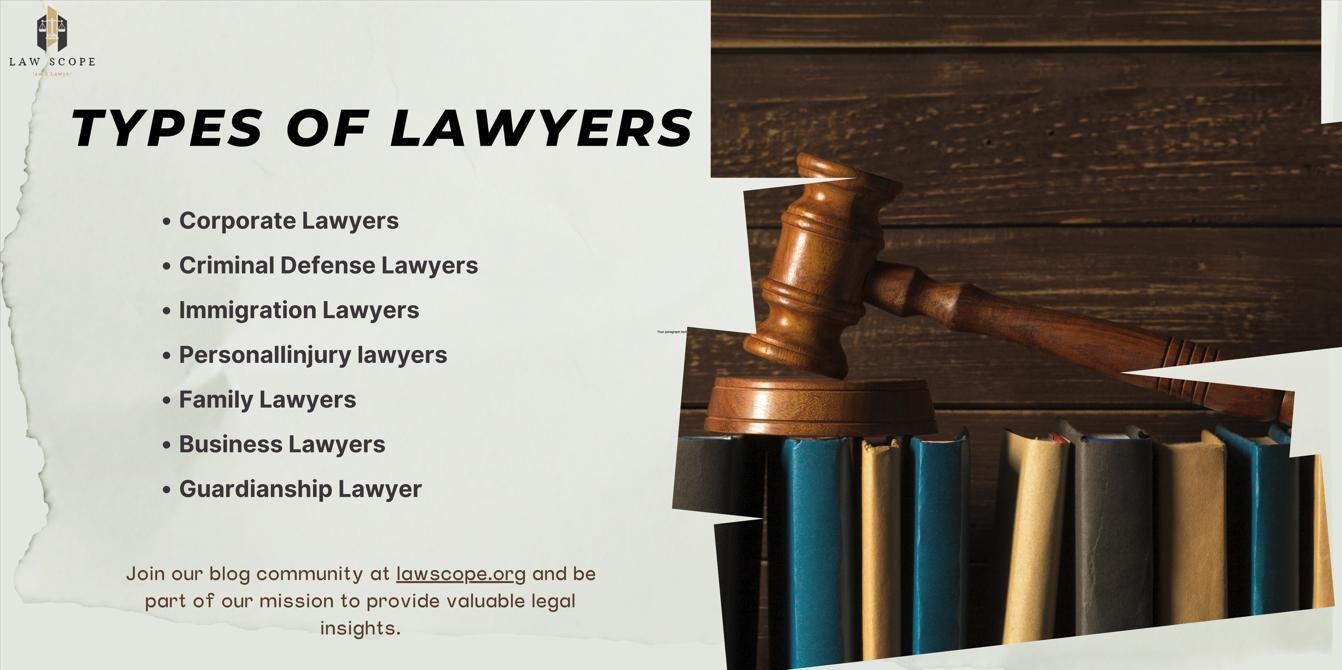Lawyers are an essential part of the American legal system. They help individuals and organizations navigate the complex landscape of laws and regulations, represent clients in court, and work to ensure that justice is served. The field of law offers a diverse range of career paths for those interested in pursuing a legal career. In this article, we will explore the different types of lawyers in the United States, their roles, and the qualifications needed to pursue these careers.
Corporate Lawyers
Corporate lawyers, also known as business lawyers, work for companies and corporations. They are responsible for ensuring that businesses comply with all applicable laws and regulations. Corporate lawyers work on issues related to contracts, mergers and acquisitions, and other legal matters.
Roles and Responsibilities
Corporate lawyers provide a wide range of legal services to businesses, including:
1. Contract Drafting and Review:
Corporate lawyers are responsible for drafting and reviewing contracts, ensuring that they comply with all applicable laws and regulations.
2. Corporate Governance:
Corporate lawyers advise clients on corporate governance issues, including the board of directors’ obligations, shareholder rights, and compliance with state and federal regulations.
3. Mergers and Acquisitions:
Corporate lawyers play a critical role in mergers and acquisitions, advising clients on legal issues related to the transaction.
4. Intellectual Property:
Corporate lawyers help businesses protect their intellectual property rights, including patents, trademarks, and copyrights.
Qualifications and Requirements
To become a corporate lawyer, an individual must complete a bachelor’s degree and then attend law school. After graduation, they must pass the bar exam in their state. Corporate lawyers often have experience working in business or finance, as well as a strong understanding of corporate law.
Criminal Defense Lawyers
Criminal defense lawyers represent individuals accused of crimes. They work to defend their clients in court and ensure that they receive a fair trial. Criminal defense lawyers also provide legal advice and guidance to their clients throughout the legal process.
Roles and Responsibilities
Criminal Defense Lawyers play a critical role in the criminal justice system, providing legal representation to defendants accused of crimes. They work to ensure that their clients receive a fair trial and are not wrongfully convicted. Their responsibilities include:
1. Investigating The Case:
Criminal defense lawyers investigate the case, review evidence, and interview witnesses to build a defense strategy.
2. Representing The Defendant:
Criminal defense lawyers represent the defendant in court, including at trial, and negotiate plea deals with the prosecution.
3. Negotiating With Prosecutors:
Criminal defense lawyers negotiate with prosecutors to reduce charges or seek alternative sentences for their clients.
4. Advising The Defendant:
Criminal defense lawyers advise their clients on the legal process, potential outcomes, and options for their cases.
Qualifications and Requirements
To become a criminal defense lawyer, an individual must complete a bachelor’s degree and then attend law school. After graduation, they must pass the bar exam in their state. Criminal defense lawyers often have experience working in criminal law or as public defenders.
Immigration Lawyers
Immigration Lawyers specialize in helping clients navigate the complex and ever-changing field of immigration law. They assist clients with issues such as obtaining visas, green cards, and citizenship, as well as defending against deportation.
Roles and Responsibilities
Immigration lawyers provide legal assistance to individuals and families navigating the immigration system. Their responsibilities include:
1. Assisting with Visa Applications:
Immigration lawyers assist clients with visa applications, ensuring that they are completed correctly and submitted on time.
2. Representing Clients in Court:
Immigration lawyers represent clients in immigration court, defending them against deportation and advocating for their rights.
3. Helping with Citizenship Applications:
Immigration lawyers assist clients with the citizenship application process, including completing the necessary forms and preparing for the citizenship test.
4. Providing Legal Advice:
Immigration lawyers provide legal advice to clients on immigration issues, including changes to immigration laws and regulations, and the impact of these changes on their cases.
Qualifications and Requirements
To become an immigration lawyer, an individual must complete a bachelor’s degree and then attend law school. After graduation, they must pass the bar exam in their state. Immigration lawyers often have experience working in immigration law, international law, or as an advocate for immigrant rights.
Personal Injury Lawyers
Personal Injury Lawyers represent individuals who have been injured in accidents, such as car accidents, slips, falls, or medical malpractice. They work to help their clients receive compensation for their injuries, including medical expenses, lost wages, and pain and suffering.
Roles and Responsibilities
Personal injury lawyers play a critical role in helping individuals who have been injured in accidents. Their responsibilities include:
1. Investigating The Accident:
Personal injury lawyers investigate the accident, review medical records, and interview witnesses to build a case.
2. Negotiating with Insurance Companies:
Personal injury lawyers negotiate with insurance companies to obtain a fair settlement for their clients.
3. Representing Clients In Court:
Personal injury lawyers represent clients in court, advocating for their rights and seeking compensation for their injuries.
4. Providing Legal Advice:
Personal injury lawyers provide legal advice to clients on the legal process, potential outcomes, and options for their cases.
Qualifications and Requirements
To become a personal injury lawyer, an individual must complete a bachelor’s degree and then attend law school. After graduation, they must pass the bar exam in their state. Personal injury lawyers often have experience working in personal injury law or insurance law.
Family Lawyers
Family Lawyers specialize in issues related to family law, including divorce, child custody, and adoption. They work to help families navigate complex legal issues and find solutions that are in the best interest of their clients.
Roles and Responsibilities
Family lawyers provide legal assistance to individuals and families navigating the family law system. Their responsibilities include:
1. Divorce:
Family lawyers help clients navigate the divorce process, including dividing assets and determining child custody and support.
2. Child Custody:
Family lawyers represent clients in child custody disputes, advocating for their rights and the best interests of the child.
3. Adoption:
Family lawyers assist clients with the adoption process, including completing the necessary paperwork and advocating for their clients in court.
4. Domestic Violence:
Family lawyers represent clients who have been victims of domestic violence, helping them obtain restraining orders and protecting their rights.
Qualifications and Requirements
To become a family lawyer, an individual must complete a bachelor’s degree and then attend law school. After graduation, they must pass the bar exam in their state. Family lawyers often have experience working in family law or related areas, such as social work or psychology.
Conclusion
In conclusion, the field of law offers a diverse range of career paths for those interested in pursuing a legal career. This article has explored some of the different types of lawyers in the United States, including corporate lawyers, criminal defense lawyers, immigration lawyers, personal injury lawyers, and family lawyers. Each type of lawyer plays a critical role in the legal system, advocating for their clients and ensuring that justice is served.
To pursue a career in law, individuals must complete a bachelor’s degree, attend law school, and pass the bar exam in their state. Many lawyers also have experience working in related fields before pursuing a legal career. Whether you are interested in working for a corporation, defending individuals accused of crimes, or helping families navigate complex legal issues, there is a career path in law that can match your interests and skills.
FAQs ( Frequently Asked Questions )
1. What are Some Other Types of Lawyers In The United States?
Aside from the types of lawyers discussed in this article, there are many other types of lawyers in the United States, including:
(I) Employment Lawyers represent employees or employers in workplace-related disputes.
(II) Environmental Lawyers, who work on issues related to environmental law and policy.
(III) Intellectual Property lawyers, assist clients with patents, trademarks, and copyrights.
(IV) Real Estate Lawyers assist clients with legal issues related to real estate transactions.
2. What Qualifications are Required To Become a Lawyer In The United States?
To become a lawyer in the United States, an individual must typically complete a bachelor’s degree, attend law school, and pass the bar exam in their state. Specific qualifications and requirements may vary by state.
3. How Do Lawyers Advocate For Their Clients In Court?
Lawyers advocate for their clients in court by presenting evidence, arguing on their behalf, and making legal arguments to the judge or jury. They may also negotiate with opposing counsel to settle outside of court.
4. What are Some Common Misconceptions About Lawyers?
Some common misconceptions about lawyers include:
(I) All lawyers are wealthy and live extravagant lifestyles.
(II) Lawyers are always aggressive and argumentative.
(III) Lawyers only care about winning, not justice or fairness.
(IV) Lawyers are dishonest and unethical.
While there may be some lawyers who fit these stereotypes, the majority of lawyers are hardworking professionals who are dedicated to advocating for their clients and upholding the law.
You May Like Also:





Leave a Reply